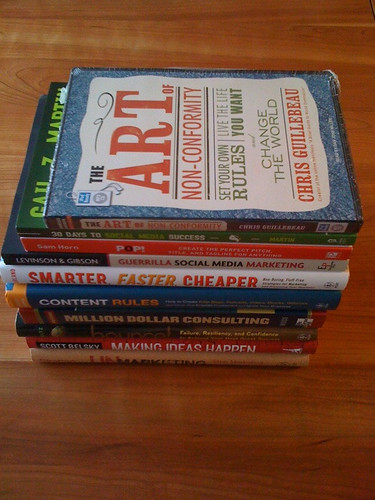How does our current recession (or more likely, soft depression) compare with the Great Depression? For an excellent account of the United States' last go-round with economic collapse, I'd highly recommend
The Great Depression: A Diary
by Benjamin Roth.
Roth is a Youngstown, Ohio based attorney who details a compelling play-by-play of the Depression, spanning from 1931 to 1941. A highly intelligent and intellectually curious individual, Roth not only provides us with a look at what life was actually like during that time, but he also attempts to fill in the pieces and anticipate when things will actually get better, based on an extensive amount of economic reading he does concurrently with his experience.
I'd like to highlight a few of the key themes that I found interesting and relevant for us.
Cash is King - Before, During, and After the Crash
The drum that beats throughout Roth's diary is that during the Great Depression, cash was truly king - namely because nobody had any. There were asset bargains to be had, for sure, and often Roth was able to pick out what he knew were outstanding values in stock prices. But he was usually unable to pull the trigger due to lack of cash - his law practice was limping along, and he had no dry powder in reserve.
We saw an analogous situation in 2007-2009, when the credit crisis sent stocks and just about everything else down 50% or more. In retrospect, didn't gold look cheap below $700 and oil look like a bargain below $35? Sure hindsight is 20/20, but in order to pull the trigger on value plays, you'd have needed to step in with CASH - the exact thing that most people didn't have at the time.
So how do you make sure you do have cash? Roth believes the only way to do it is to "cash out near the top and put holdings in government bonds" (which were actually still safe cash equivalents in the 1930's). Of course, easier said than done, and it'd have taken real guts to cash out of stocks in 2006 when everything looked quite sanguine. But the moral of the story appears to be that in order to be able to step in and buy when the blood is gushing in the streets, you need to assure you have dry powder available, and the time to raise cash is during the boom.
Roth pounds this theme throughout the book, later restating his belief that "guarding against loss of capital is the most important" investing strategy you can employ. Experienced investors and traders will agree wholeheartedly with Roth.
Stock Prices and Business "Fundamentals" are Two Different Things Altogether
Every upturn in stock prices seemed to occur without any concurrent improvement in general business conditions. So while the initial 1929 crash led (and/or caused) the initial downturn in the economy, there were little or no clues to be had about the direction of the stock market if you only looked at Main Street (sound familiar?)
The 1932 stock market upturn, off of what ultimately proved to be THE bottom, was "fast and furious" as described by Roth, completely taking him by surprise. His law practice stayed in the tank for a decade or longer, with no measurable, sustainable signs of improvement. So any armchair economic observer who tried to search for undercover business improvements as potential tip offs to a stock market rise would have been left frustrated, and probably flat wrong too.
If there was a stock buying approach that would have worked then, and now, it'd have been to buy stocks when they look cheap - WITHOUT margin - and hold them for a long time until they appreciate to fair value. Sounds pretty boring, I know, but the few folks who did it made an absolute killing according to Roth. Most weren't able to do this, though - most, like him, had no spare cash. Those that did often levered up with margin, and were wiped out during a subsequent crash. The margined traders of the 1930's suffered the same common fate of the margined traders of today - eventually, they busted.
And stocks WERE cheap during the Great Depression - selling for 5 to 8 times earnings, and yielding 5% or more. A far cry from the comical "values" we have in today's market, where 15x earnings is regarded as a reasonable fair value, and a 2% yield is considered a healthy dividend!
Constant Inflation Worries and Competitive Currency Devaluations - Then and Now
Roth was constantly concerned that inflation was just around the corner, particularly when FDR started implementing his aggressive devaluation measures. The situation was actually remarkably similar to today, as there was no visible uptick in prices, because there was no purchasing power. But when priced in gold, the US dollar (and most other currencies, too) were devalued significantly.
Don't forget that FDR actually made it illegal for individual Americans to own gold. Then after he confiscated bullion from those who disobeyed, he subsequently devalued the dollar by 40%! Many Americans have no idea this ever happened.
While gold could be confiscated again, thus far Bernanke has been content to run the printing presses and devalue the dollar via QE (and actually, Greenspan was the one who started tossing the dollar out the window as early as 2002). Thus an overnight devaluation is not as big a threat, since the dollar is marked to market with each trade - the dollar has ALREADY been devalued (which is why
we are actually near term dollar bulls).
Inflation never came as Roth feared, but when priced in gold, the US dollar was certainly shredded, as were most other currencies at the time as well. Eerily similar to today's rounds of competitive devaluations. After reading this account, I now expect the gold bull market to continue to roll against most major currencies, until central banks get serious about protecting their currencies - and that doesn't look like it's anywhere close to happening!
Roth's General Conclusions from the Great Depression
In 1937, our guide penned some general conclusions he was able to draw from the depression that "just ended" - while the double dip after 1937 later showed that the depression actually had not ended, I found Roth's points to be excellent:
- While many law practices suffered throughout the depression, Roth believes the lawyer who "specialized in bankruptcies, receiverships, and reorganizations reaped a harvest throughout the depression." Moral of the story: Depressions are times to pivot your business. Don't be wed to the status quo.
- "If you once determine that you are at the beginning of a major depression, then liquidate your investments at once even at a loss because later on you will be able to buy back at a fraction of the price. An investor who sold out at a loss in 1930 or 1931 could have bought back at 1/4 the price in 1932."
- "Cash is king in every depression. A small investment in real estate or stocks or bonds in 1932 would be worth a fortune today. Few men had both the cash and the courage to buy when things looked the bleakest."
- "During the past depression, prominent bankers, business men, etc. were all wrong in most of their predictions. Use your own judgment and do your own thinking." (Emphasis mine)
My Conclusions and Comparisons with Today's Depression
- If you compare Roth's account with today's conditions, it'd be tough to conclude that we are heading for another Great Depression. From a general feel standpoint, the current climate sure seems to rhyme more with Japan's recent/current soft depression and lost decades. While it's worth preparing for the worse case scenario (and check out Porter Stansberry's End of America video if you need a nudge there), I am operating under the assumption that social and economic conditions in the US are not going to completely collapse over the next decade, but rather we're more likely to stay in a soft depression type of slump.
- While cash is certainly king, I think cash FLOW is emperor and master of the universe. A lump pile of cash is awesome, no doubt, especially when bargains are to be had. But an investment that can spin regular cash flow back your way, like a business that continues to run and churn during soft economic times, is the best thing you can have. Cash flow is a "great to have" during all conditions, inflationary or deflationary.
- Don't get too spun up trying to predict the future. It's fun, but it's also often a fruitless venture. Stay lean and stay mean. Don't saddle yourselves with long term obligations (avoid things like long term leases and mortgages if possible - see my Renter's Manifesto for motivation). Stay away from margin and levered bets. In the startup world, we have a term called "lean startup", which refers to the philosophy of doing just enough to make it to your next milestone - so that wasted effort is minimized. Depressions are perfect times to adopt "lean living" principles, where you only plan for the next 6 months or year at most, while staying lean and agile in your occupation, living conditions, and finances. Conserve your effort and resources as best you can, and be prepared to pivot if the situation changes!
For more investing related thoughts, news, and musings, please visit my blog at ContraryInvesting.com.




















